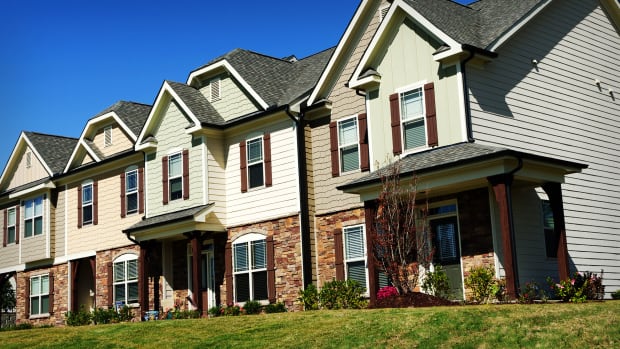It has been rough out there for first-time homebuyers.
First they have to put together a down payment of at least 3% of a home's sale price. That comes in at $11,760 of the $392,000 national average sales price of a home in America.
Once they have secured funding, they then have to lock in what rates are currently going, with the first upticks in years due to Federal Reserve actions to curb inflation. And, while interest rates in the 4-5% range are historically low, they're a bitter pill to swallow after years in 3% range.
Often stymied by low supply, finding a home they like has been difficult over the last two years, especially if they are in a metro area.
When they do find something that they want, bidding wars often ensue, and other buyers with all-cash offers are likely to win any tussle over a home's sale price are likely to win out.
That puts them right back where they started, leaving them wondering: Is it always this hard? Is now even a good time to buy a home?
The answer to that varies, depending on who you ask and what you are looking for — and how soon you may need it.

Shutterstock
Here's What the Experts Say About Buying a House Now
Dion McNeeley, a real estate investor who got into the market after the Great Recession and has since recouped $2 million on his investments, said that even with the market's bumps, now is a smart time to buy a home (but he's not speaking as someone who intends to live in the home).
"'It’s always a good day to buy a great deal. Period. Always," he told TheStreet.
"If prices go up you gain equity. If prices go down you pay less taxes," he said. "I don’t care if my assets lose value. We care about rents. And in my life I have never seen them go down. Not even after 2008."
Other market watchers said it really depends on your situation.
Kayla Bruun, economic analyst at decision intelligence company Morning Consult, told TheStreet that data shows many people are pulling back as they wait for the market to cool.
"Morning Consult’s index of consumer sentiment sank lower in recent months, and a lot of that is driven by the declining share of consumers who say that now is a good time to make a major purchase, which would include a home," Bruun said.
But there are still plenty of people who need housing and who are ready to make the leap from renting to buying, and they likely are not deterred by a few upticks in interest rates.
"Compared to a few months ago, when borrowing costs were lower and prices were maybe even a bit below where they are now, you won’t be getting as good a deal, but that is all relative," Bruun said.
"Whether or not it’s a good time to buy a home can really depend on an individual’s situation at that time, including what their specific needs are and what are the alternatives."
How Does Inflation Affect Home Buying?
Would-be buyers also shouldn't be too spooked by the current 8.5% inflation, which has left many people wondering if they should wait to pull the trigger on such a major purchase.
"Inflation is your friend when you own appreciating assets," McNeeley said. "I gained over $600k in net worth in 2021. Just because I owned properties."
Bruun, too, said that while inflation may be high now, and the market will see dips and correction, eventually real estate will go up in value.
"Land is limited and prices do tend to rise in the long run," Bruun told TheStreet. "There [are] also opportunity cost to consider."
Are We in a Housing Bubble?
But many investors, economists, realtors and homebuyers all disagree over whether or not we are in a housing bubble.
You can read a deeper dive on that here.
Technically, a housing bubble means that the homes on the market are overpriced, which means that a price correction is inevitable and eventually the market will go back to more affordable options.
Bruun said that's not what is happening now.
Instead, buyers are facing a major lack of supply, either of new homes or homes that aren't going onto the market.
Bruun said that Morning Consult data over the past year has shown that many more adults are trying to buy homes than are planning to sell them over the next 12 months, which leads to a kind of uber-sellers market.
"There are real factors underpinning that demand, including demographics [like] millennials starting families and wanting more space, and pandemic-related lifestyle changes [like] remote work enabling geographic flexibility," Bruun said.
McNeeley took issue with supply being the major culprit of the overheating housing market.
"Supply is what a lot of people say but this is inaccurate. We had over six million in transactions in 2021, meaning supply was there," he told TheStreet. "Demand is the issue, with record wage inflation. People can pay more."
He added that there are also other unprecedented economic developments that many economists and other experts might not have had the chance to study yet.
"We have the highest 'consumer confidence' we have ever seen in my life. For decades people thought you would lose your house if we weren’t allowed to work," he said "But that was proven untrue. We had a pandemic. An actual country shut down."
"Which gave us: An eviction moratorium. Stimulus. Unemployment, extended and extra. Forbearance. With the missed payments being added to the end of the mortgage or lenders offering a 40-year mortgage," McNeeley said.
That longer lifeline for homeowners means that more people are able to stay in their homes than ever before, which has crimped how many houses are available to buy.
Should You Wait For More Supply to Buy?
Getting more inventory into the marketplace is likely one of the main things that will reset housing prices to affordable levels.
But how do you coax builders wary of supply chain delays and rising inflation into building more homes? Or tempt long-time homeowners to put their houses on the market?
Bruun said that strong demand and limited supply are pushing home prices higher, but so is a tight labor market.
"That plus bottlenecks on new construction, which is making new homes take longer to deliver and pressuring builders to ask higher prices on new homes to cover their construction costs," Bruun said.
So what can be done to get more inventory into the marketplace? Perhaps sadly for first time buyers, that will probably take higher housing prices, which will make building things worthwhile for investors and construction companies.
There are signs of that beginning, however nascent, too.
"Permits and housing starts have picked up, so that will add to inventory down the line," Bruun said.
"Supply chain disruptions and the tight labor market are holding back the pace of completions, so easing constraints for materials and workers could help speed up deliveries and allow housing stock to expand a bit sooner."







